Meet the Havanese – the ultimate canine party animal! These lively, lovable furballs bring fun wherever they go with their playful personalities.
Forget lazy lapdogs, Havanese pups pack tremendous spirits into their petite packages. Their infectious joy and enthusiasm for life give them an almost puppy-like temperament, regardless of age. They thrive on social interaction and are always excited to make new human and animal friends.
With off-the-charts charm and an insatiable zest for adventure, every day with a Havanese feels like a party. They’re down for anything – long walks, playing fetch for hours, learning silly tricks to make you smile. But don’t mistake their high energy for hyperactivity. These intelligent pups know when it’s time to relax and cuddle.

Sound like the perfect fit for your lifestyle? Understanding the unique Havanese temperament before adoption lets you predict how delightful life with one of these furry sidekicks will be. So prepare for impromptu dance parties, countless laughs, and memories to last a lifetime!
Table of Contents
- 1 Havanese’s Interaction with Family and Strangers
- 2 Havanese Dogs: Health and Nutritional Requirements
- 3 Training and Adaptability of Havanese Dogs
- 4 Havanese: Apt for Apartment Living?
- 5 Grooming Needs of a Healthy Havanese
- 6 Playfulness and Mouthiness in Havanese
- 7 Wrapping Up on Havanese Temperament
- 7.1 Are Havanese dogs good for first-time pet owners?
- 7.2 Do Havanese dogs bark a lot?
- 7.3 How often should I groom my Havanese dog?
- 7.4 Are Havanese dogs hypoallergenic?
- 7.5 What kind of diet is best for a Havanese dog?
- 7.6 Can Havanese dogs live comfortably in apartments?
- 7.7 Are Havanese dogs prone to any specific health issues?
- 7.8
- 8 Related posts:
- 9 5 Essential Training Tips for Your New Havanese Puppy
- 10 Ultimate Guide to Havanese Colors
- 11 25 Happy Havanese Puppies
- 12 Havanese Puppy Guide: Breed Info, Care Tips & More!
Havanese’s Interaction with Family and Strangers
Havanese dogs, part of the bichon family, are social butterflies. They love their families and enjoy being involved in all activities. Their basic obedience skills make them great family dogs.
- They love playing with children.
- Provide company to parents.
- Enjoy other pets in the house.
Havanese shedding is minimal, making them perfect for families caring about cleanliness.
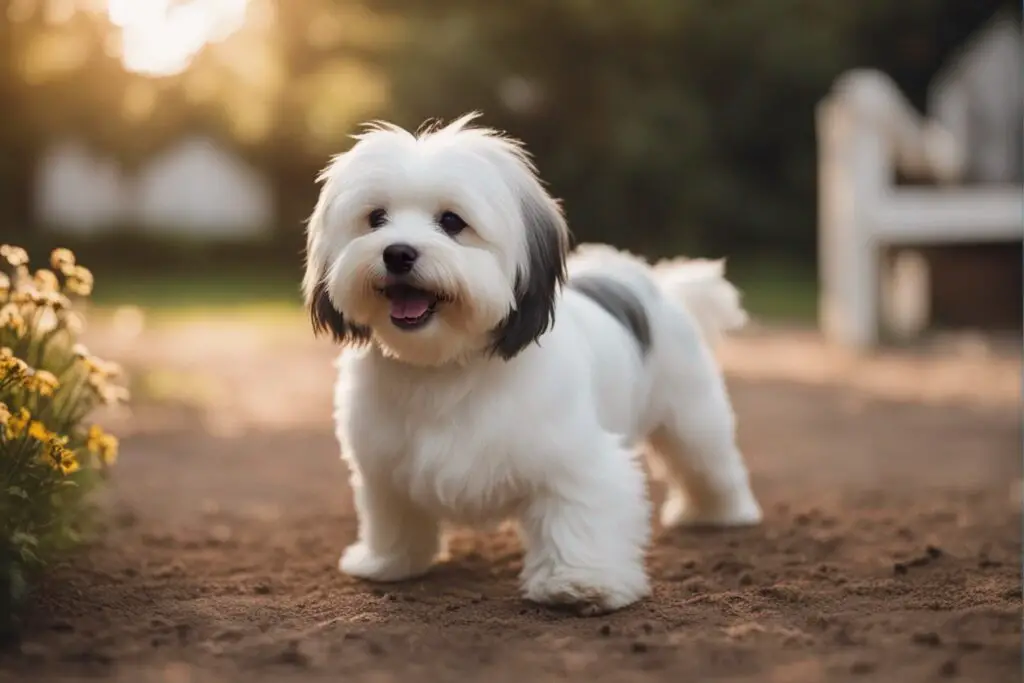
But what happens when new people enter the picture? The Havanese temperament towards strangers can be a mixed bag. Some show instant friendliness, while others may hold back a bit.
- Some wag their tail and extend a friendly hand (or paw)
- Others might take some time to warm up
The difference often lies in early socialization. Socializing your pet from a young age helps them feel comfortable around new people and animals. This process involves introducing them to different environments and situations.
- Take them to parks.
- Introduce them to other animals.
- Let them meet your friends.
This can help shape their interaction skills, making it easier for you and your pet in the long run. So whether you welcome guests or introduce your Havanese to another pet, remember that love, patience, and early socialization are essential.

Havanese Dogs: Health and Nutritional Requirements
Essential Nutrients
A healthy diet is vital for your Havanese. Dog food needs to pack in the proper nutrients:
- Protein: For energy and muscle development.
- Fats: To maintain skin and coat health.
- Carbohydrates: For sustained energy levels.
- Vitamins & Minerals: For overall health.
Health Issues & Prevention
Havanese dogs can be prone to specific health conditions. Here’s a quick search list of common issues:
- Hip Dysplasia
- Heart Murmurs
- Patellar Luxation
Preventive measures? Regular exercise, a balanced diet, and avoiding obesity are top of the list.
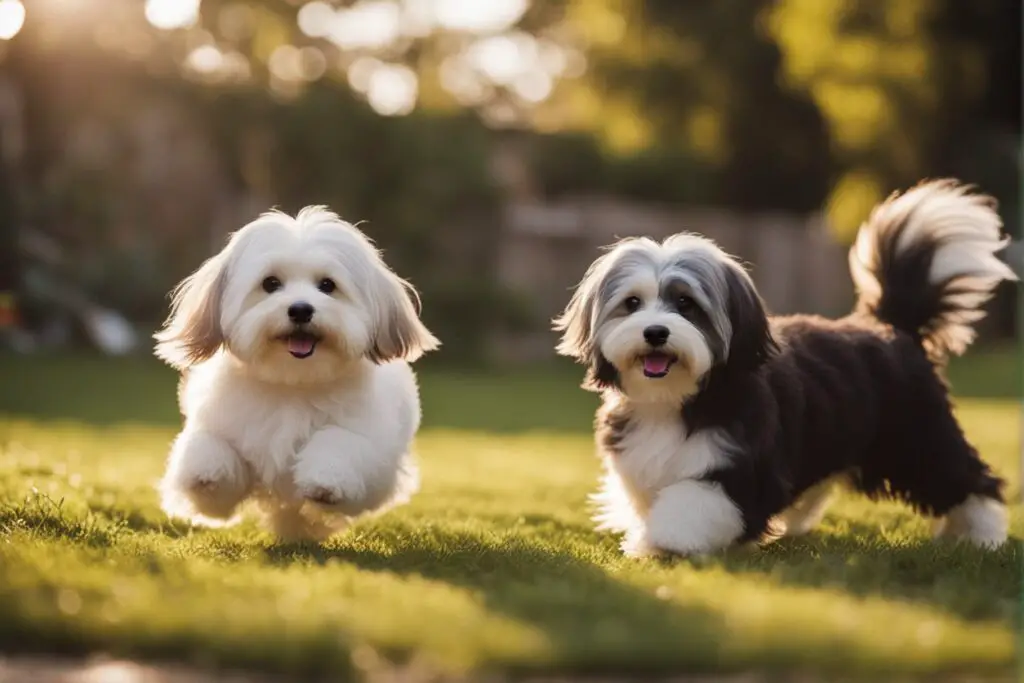
Vet Check-ups
Don’t skip those vet appointments! Regular check-ups help catch any potential health problems early on. Vets provide crucial dog care information that helps maintain your pet’s health clearances.
Remember, a healthy Havanese is a happy one!
Training and Adaptability of Havanese Dogs
Quick Learners or Slow-Paced?
Havanese dogs, like other dog breeds, have varying intelligence levels. However, they generally show a high potential for learning agility and obedience. They can excel in dog sports and activities with the proper Havanese puppy training methods.
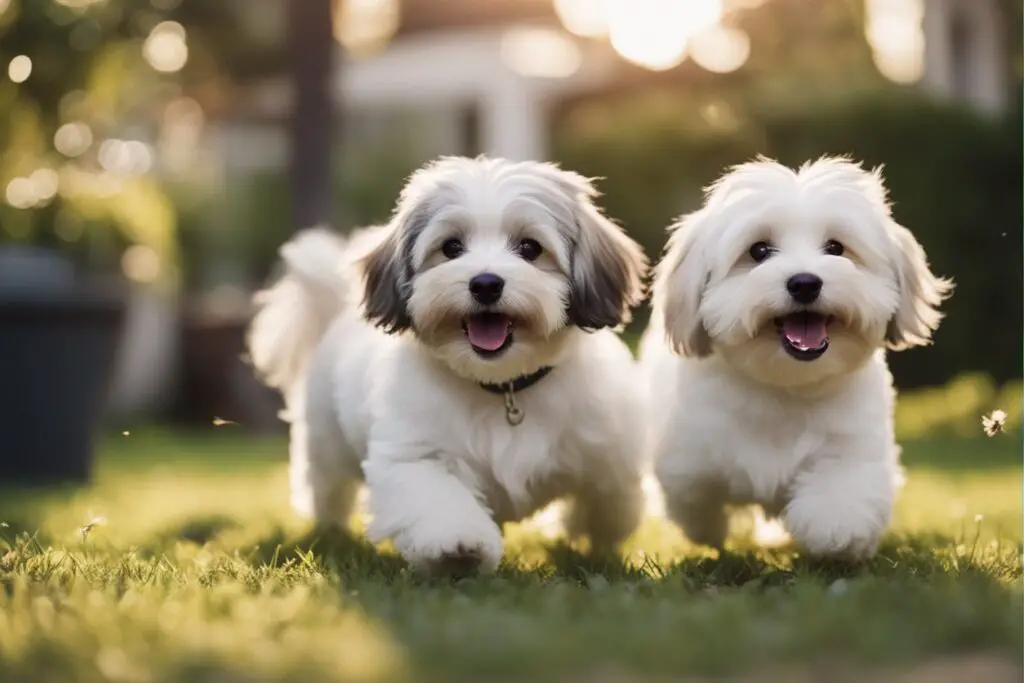
- Trainability: They’re quick learners with a knack for picking up new tricks.
- Potty Training: Havanese puppies might take some time to master this skill. Adult dogs from rescue groups may already be house-trained.
Positive Reinforcement Methods
Positive reinforcement plays a crucial role in training these dogs.
- Rewards: Offering treats or praise works wonders in boosting their motivation.
- Consistency: Keep the rules consistent to avoid confusing your dog.
- Patience: Some skills take time to learn. Don’t rush the process.
Adaptation to New Environments
Havanese dogs are adaptable creatures that handle changes well if properly introduced.
- Moving House: Give them time to explore their new surroundings at their own pace.
- Changing Family Dynamics: Whether it’s a new baby or another pet, gradual introductions help ease the transition.
Understanding your Havanese dog’s temperament is critical to practical training and ensuring they adapt comfortably to changes.

Havanese: Apt for Apartment Living?
The Havanese and Apartment Living
The Havanese breed is a small dog, making it an ideal choice for apartment living. Their compact size means they don’t need much space to roam around. They’re intelligent too, which makes them adaptable to different living conditions.
- Size: Small dogs like the Havanese fit well in apartments.
- Intelligence: They can adjust to their environment quickly.
Exercise Needs vs. Space Constraints
Havanese dogs have moderate exercise needs. A couple of short walks and some indoor playtime should be enough. Despite being small dogs, they enjoy being active.
- Short Walks: Two short walks per day are usually sufficient.
- Playtime: Indoor games can help meet their exercise needs.
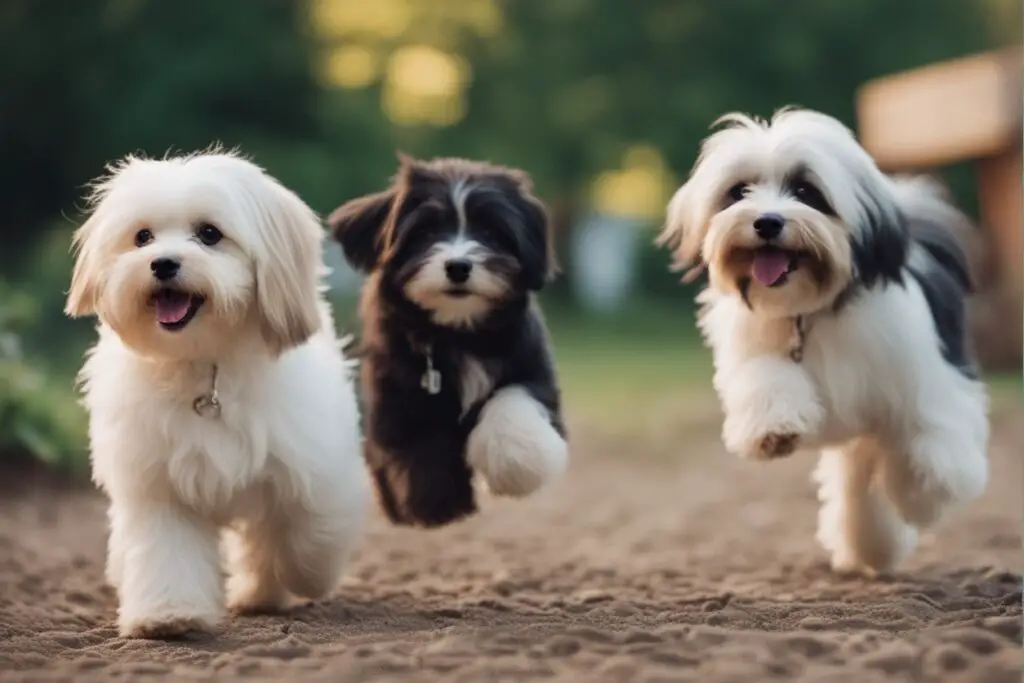
Noise Factor
Are you worried about your Havanese disturbing your neighbors? Well, these little fellas aren’t excessively vocal unless bored or anxious. Keeping them entertained can help keep the noise down.
- Entertainment: Keep them busy with toys and games.
- Anxiety Management: Training can help manage any anxiety-related barking.
In sum, if you’re considering a small dog for apartment living, the intelligent and adaptable Havanese could be right for you!
Grooming Needs of a Healthy Havanese
Grooming your Havanese isn’t just about keeping them looking spiffy. It’s crucial for their health and happiness too.
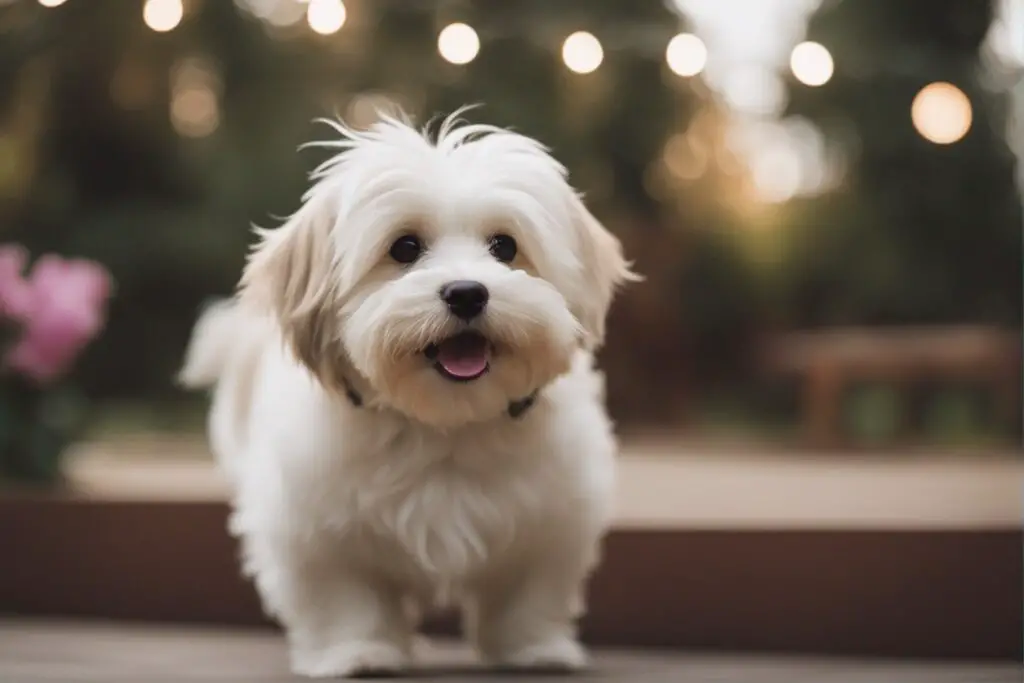
Frequency Matters
Havanese dogs need regular grooming sessions, at least once a week. Without it, their long, silky coats can quickly turn into a tangled mess.
Key Areas to Focus On
When you’re grooming your fluffy friend, don’t just stop at the coat. Here’s a quick rundown:
- Coat: Brush it regularly to prevent matting and tangling.
- Ears: Clean them weekly to avoid infections.
- Teeth: Brush daily to maintain good dental health.
- Nails: Trim every two weeks or so.
Professional vs. Home Grooming
The choice between professional and home grooming depends on you and your dog’s needs.

Pros of Professional Grooming
- They know what they’re doing.
- They have all the right tools.
Cons of Professional Grooming
- It can be pricey.
- Your dog might not enjoy the experience.
Pros of Home Grooming
- It saves money.
- It can be a bonding experience for you and your pet.
Cons of Home Grooming
- You need to learn how to do it properly.
- You’ll need to invest in quality tools.
So there you have it! The lowdown on grooming your Havanese pup – how often, where to focus, and whether to go pro or DIY. Remember, it’s not just about looks; proper grooming is vital for their health!

Playfulness and Mouthiness in Havanese
Havanese puppies are known for their affectionate nature. They love games and outdoor activities, making them a lively addition to any family.
Pup’s Playtime
- Fetch: Toss a ball or toy; your pup will love the chase.
- Hide and Seek: Havanese pups enjoy this game; it stimulates their mind.
- Agility Training: Set up mini obstacles at home.
However, these puppies also tend to have mouthiness. This involves nipping or chewing on objects (or people) as part of their playful behavior.
Chewy Pups
- Furniture Nipping: Young pups may chew on furniture legs.
- Shoe Chewing: Your favorite pair might be at risk!
- Hand Nipping: Playful, but can become an issue if not addressed.
To manage excessive mouthiness:
- Provide chew toys for your puppy.
- Ensure they get lots of exercise to reduce boredom-induced chewing.
- Train them with simple tricks like the ‘leave it’ command.
Barking is another aspect of the Havanese temperament you’ll need to manage. While they don’t typically bark excessively, potty training can sometimes trigger more barking than usual.
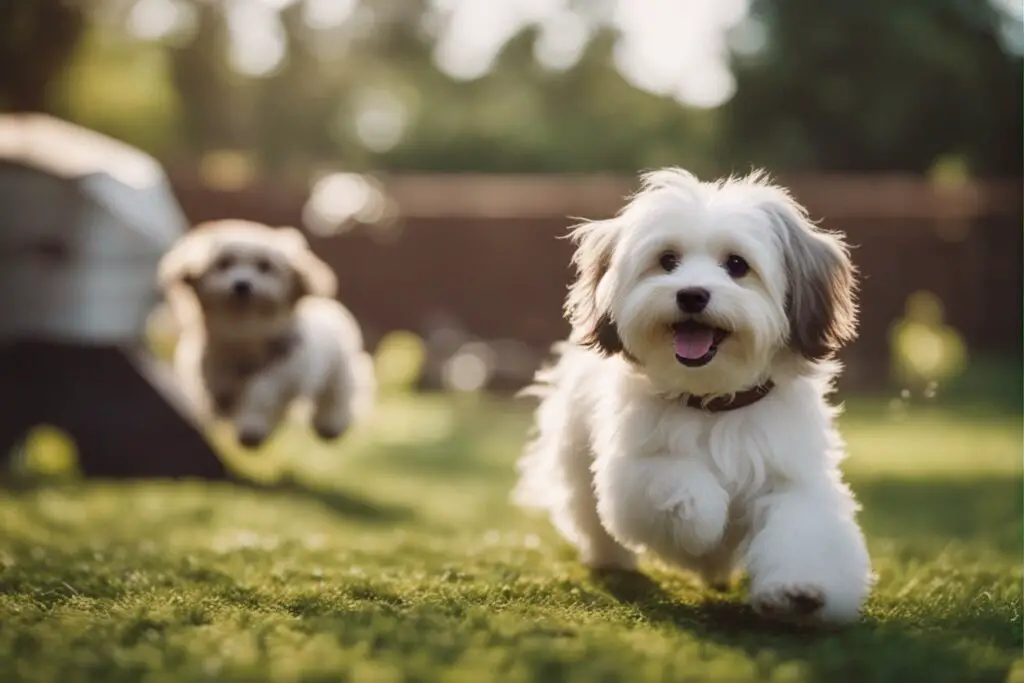
Remember, every pup is unique! Their quirks make them special, so embrace the playfulness and manage the mouthiness with patience and consistent training.
Wrapping Up on Havanese Temperament
So, there you have it! The lowdown on the Havanese breed. These little fluff balls are not just a pretty face – they’re family-friendly, adaptable, and apartment-ready. Plus, their playful nature and moderate grooming needs will keep you on your toes without driving you up the wall. It sounds like a win-win situation if you ask me!
Before diving in headfirst, remember to consider their health and nutritional needs. Every puppy is unique and deserves the best care possible. So why wait? Go ahead and welcome this furry bundle of joy into your home. You won’t regret it!
Are Havanese dogs good for first-time pet owners?
Absolutely! Their friendly nature and adaptability make them an excellent choice for first-time pet owners.
Do Havanese dogs bark a lot?
Generally speaking, Havanese dogs are not excessive barkers. However, like any dog breed, they may bark when bored or anxious.
How often should I groom my Havanese dog?
Havanese dogs require regular grooming due to their long hair. Brushing them several times a week can help prevent matting.
Are Havanese dogs hypoallergenic?
Yes! They are considered hypoallergenic, making them an excellent option for people with allergies.
What kind of diet is best for a Havanese dog?
A balanced diet that includes high-quality proteins, carbohydrates, fats, vitamins, and minerals, is ideal for the overall health of your Havanese.
Can Havanese dogs live comfortably in apartments?
Indeed! Their small size and adaptable nature make them perfect for apartment living.
Are Havanese dogs prone to any specific health issues?
Like all breeds, they can be prone to hip dysplasia or eye disorders. Regular vet check-ups can help catch these early.